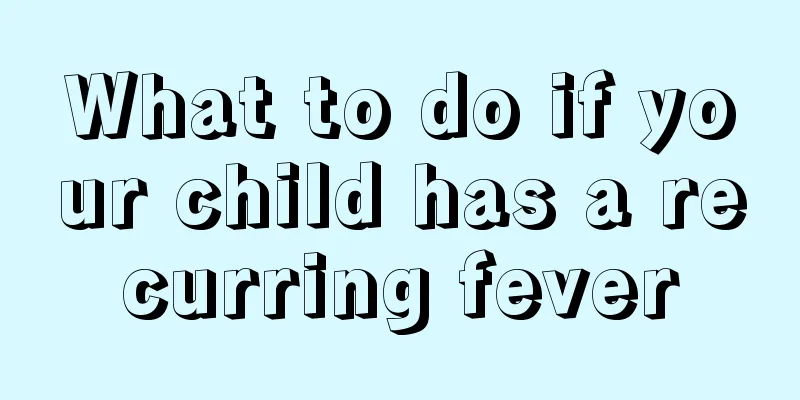What to do if your child has a recurring fever

|
Generally speaking, infants are prone to fever, mainly because their own sleep regulation system has not yet fully developed, so it is often accompanied by changes in external environmental factors, but sometimes it is not a fever or other pathological diseases. For example, in the evening, the baby's body temperature is often higher than in the early morning; the baby's body temperature will also rise temporarily after eating, crying, or exercising; if the baby's clothes are too thick, the room temperature is too high, etc., the baby's body temperature will also rise. If your baby has this temporary, small temperature fluctuation, it should not usually be considered pathological as long as he is in good general condition, energetic, and has no other symptoms and signs. 1. Maintain air circulation in the home: If the home has air conditioning, maintain the room temperature between 25-27℃. You can place your baby in an air-conditioned room or use an electric fan to blow around him to slowly lower his body temperature and make him feel more comfortable. But if the child's limbs are cold and the child is shivering violently, it means that warmth is needed. For the child's comfort, you can soak his hands and feet in warm water. Generally, the temperature of children who have chills may continue to rise. 2. Take off too many clothes: If the baby's limbs and hands and feet are warm and the whole body is sweating, it means that the baby needs to dissipate heat, so he can wear fewer clothes. 3. Warm water bath: Undress the baby and rub the whole body with a warm water (30~37℃) towel. This will dilate the blood vessels in the baby's skin and release body qi. In addition, when water vapor evaporates from the body surface, it will also absorb body heat. 4. You can use a cooling patch: the water in the gelatinous substance of the cooling patch can take away the heat when it evaporates, and there will be no excessive cooling. (The effect is not obvious, you can use it if you want.) It is not recommended to use an ice pillow because it is difficult for the baby to turn his body and an ice pillow can easily cause local overcooling or hypothermia. 5. Drink more water/milk: Give your baby more water/milk to help with diuresis and detoxification, and prevent dehydration. Water has the function of regulating temperature, which can lower body temperature and replenish water lost in the baby's body. Milk (80-90% is water.) |
<<: What causes hearing loss in children? Causes of hearing loss in children
>>: Is it normal for babies to spit up milk in a spraying manner?
Recommend
What should I do if my child has a stomachache? It is enough to learn these methods
There are many reasons why children may have stom...
What are the causes of herpetic pharyngitis in children?
With the rapid development of society, various ac...
How to treat a two-year-old baby's poor stomach
The problem of a two-year-old baby having poor ga...
What to do if your baby has acne on his face
Parents will be very worried when they find acne ...
What food is good for babies with low fever
A low-grade fever in babies is a common symptom o...
What should I do if my baby's hand is burned?
As the baby grows, parents need to be particularl...
What to do if your baby has a stuffy nose in the middle of the night? Symptomatic treatment works quickly
If your baby has a stuffy nose in the middle of t...
What should I do if my one-year-old child has a cough and fever?
For a newborn baby, all aspects of the body still...
Baby vaccination introduction
Many parents of newborns are first-time parents a...
How much Lancen oral liquid should children take
Many people use Lanqin oral liquid when they are ...
How to treat stomach pain in children?
Stomach pain in children is something that many p...
Treatment of low fever after high fever in babies
As parents, when our children have a high fever f...
The role and function of magnesium in children
Trace elements play a vital role in the growth an...
What are the symptoms of zinc deficiency in one-year-old children?
Children of different ages have different reactio...
Cross-leg syndrome in children?
The cause of children's cross-leg syndrome is...









